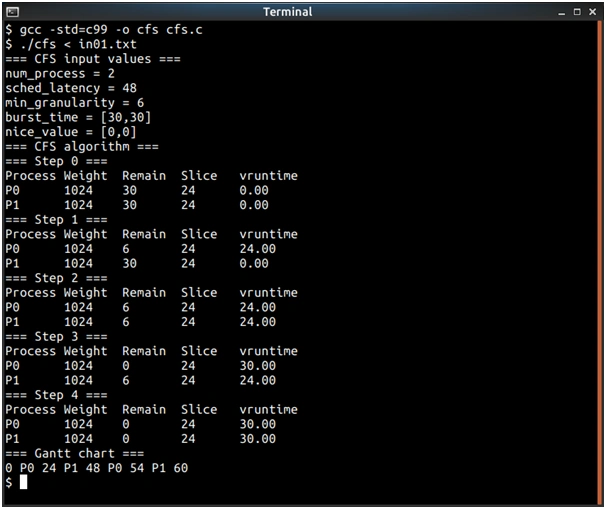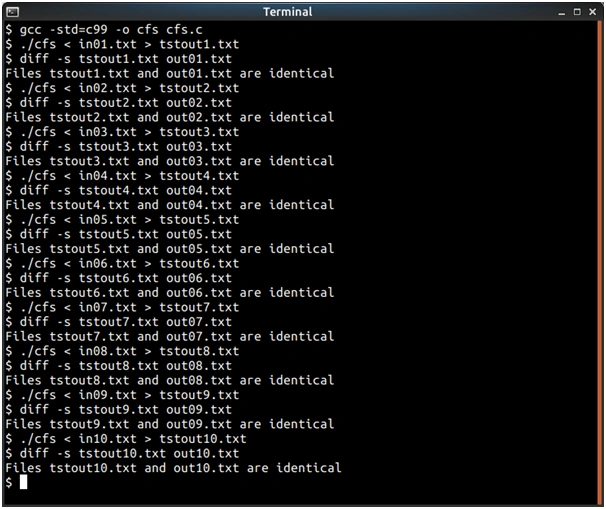Tip of the day
News
Instructions
Objective
Write a C assignment program to implement scheduler for simulated processes and record processes as Gantt charts.
Requirements and Specifications
The input parsing is given in the skeleton code. It is useful to understand the input format.
All values are either integers or strings.
You can assume that all values are valid.
- For example, num_process must be a positive integer less than or equal to 10, and so on. Empty lines and lines starting with # are ignored.
- Without these comment lines, it is very hard to understand the input file format of constant:
- Name =
Format of vector (i.e., an array of value)
- Name =
Screenshots of output


Source Code
// Note: Necessary header files are included// Do not add extra header files#define _GNU_SOURCE#include t = t + chart[i].duration; printf("P%d %d ", chart[i].pid, t); } printf("\n");}// Helper function: append an item to the Gantt chartvoid gantt_chart_append_item(int pid, int duration) { int i = num_chart_item; chart[i].pid = pid; chart[i].duration = duration; num_chart_item = i+1;}// Helper function: Check whether the line is a blank line (for input parsing)int is_blank(char *line) { char *ch = line; while ( *ch != '\0' ) { if ( !isspace(*ch) ) return 0; ch++; } return 1;}// Helper function: Check whether the input line should be skipped (for input parsing)int is_skip(char *line) { if ( is_blank(line) ) return 1; char *ch = line ; while ( *ch != '\0' ) { if ( !isspace(*ch) && *ch == '#') return 1; ch++; } return 0;}// Helper function: print an array of integervoid print_vec(char *name, int vec[MAX_PROCESS], int n) { int i; printf("%s = [", name); for (i=0;i printf("%d", vec[i]); if ( i printf(","); } printf("]\n");}// Helper: print the parsed values on the consolevoid print_parsed_values() { printf(template_parsed_values); printf(template_key_value_pair, KEYWORD_NUM_PROCESS, num_process); printf(template_key_value_pair, KEYWORD_SCHED_LATENCY, sched_latency); printf(template_key_value_pair, KEYWORD_MIN_GRANULARITY, min_granularity); print_vec(KEYWORD_BURST_TIME, burst_time, num_process); print_vec(KEYWORD_NICE_VALUE, nice_value, num_process);}// Helper: calculate the per-process time sliceint calculate_per_process_time_slice( int weight, // weight of a process int sched_latency, // the scheduler latency int sum_of_weight // total sum of weights ) { return (int)((double) weight * sched_latency / sum_of_weight);}// Helper: calculate the new per-process vruntimedouble calculate_new_vruntime( double vruntime, // the old vruntime double runtime, // how much time the process run double weight // weight of a process ) { return vruntime + (double) DEFAULT_WEIGHT / weight * runtime;} // Helper: The tokenize function// Note: Unlike PA1, we won't add the NULL item because// we won't use it with execvpvoid parse_tokens(char **argv, char *line, int *numTokens, char *delimiter) { int argc = 0; char *token = strtok(line, delimiter); while (token != NULL) { argv[argc++] = token; token = strtok(NULL, delimiter); } *numTokens = argc;}// Helper: print the CFS processes in a tablevoid print_cfs_process() { int i; printf("Process\tWeight\tRemain\tSlice\tvruntime\n"); for (i=0;i printf("P%d\t%d\t%d\t%d\t%.2f\n", i, process[i].weight, process[i].remain_time, process[i].time_slice, process[i].vruntime );}// Helper: The input parsing is given// You don't need to implement the input parsing in PA2void parse_input() { FILE *fp = stdin; char *line = NULL; ssize_t nread; size_t len = 0; char *two_tokens[2]; // buffer for 2 tokens char *process_tokens[MAX_PROCESS]; // buffer for n tokens int numTokens = 0, n=0, i=0; char equal_plus_spaces_delimiters[5] = ""; strcpy(equal_plus_spaces_delimiters, "="); strcat(equal_plus_spaces_delimiters,SPACE_CHARS); while ( (nread = getline(&line, &len, fp)) != -1 ) { if ( is_skip(line) == 0) { line = strtok(line,"\n"); if (strstr(line, KEYWORD_NUM_PROCESS)) { // parse num_process parse_tokens(two_tokens, line, &numTokens, equal_plus_spaces_delimiters); if (numTokens == 2) { sscanf(two_tokens[1], "%d", &num_process); } } else if (strstr(line, KEYWORD_SCHED_LATENCY)) { // parse sched_latency parse_tokens(two_tokens, line, &numTokens, equal_plus_spaces_delimiters); if (numTokens == 2) { sscanf(two_tokens[1], "%d", &sched_latency); } } else if (strstr(line, KEYWORD_MIN_GRANULARITY)) { // parse min_granularity parse_tokens(two_tokens, line, &numTokens, equal_plus_spaces_delimiters); if (numTokens == 2) { sscanf(two_tokens[1], "%d", &min_granularity); } } else if (strstr(line, KEYWORD_BURST_TIME)) { // parse the burst_time // note: we parse the equal delimiter first parse_tokens(two_tokens, line, &numTokens, "="); if (numTokens == 2) { // parse the second part using SPACE_CHARS parse_tokens(process_tokens, two_tokens[1], &n, SPACE_CHARS); for (i=0; i sscanf(process_tokens[i], "%d", &burst_time[i]); } } } else if (strstr(line, KEYWORD_NICE_VALUE)) { // parse the nice_value // note: we parse the equal delimiter first parse_tokens(two_tokens, line, &numTokens, "="); if (numTokens == 2) { // parse the second part using SPACE_CHARS parse_tokens(process_tokens, two_tokens[1], &n, SPACE_CHARS); for (i=0; i sscanf(process_tokens[i], "%d", &nice_value[i]); } } } } }}// initialize the array of CFSProcessvoid init_cfs_process() { int i; int weight_sum = 0, ts; for (i = 0; i < num_process; i++) { process[i].weight = nice_to_weight(nice_value[i]); process[i].vruntime = 0.0; process[i].remain_time = burst_time[i]; weight_sum += process[i].weight; } for (i = 0; i < num_process; i++) { ts = calculate_per_process_time_slice(process[i].weight, sched_latency, weight_sum); process[i].time_slice = (ts < min_granularity)? min_granularity : ts; }}// get the running process with the smallest vruntimeint get_smallest_vrt(){ int i; int imin = -1; double vrtmin = 1e6; for (i = 0; i < num_process; i++) { if (process[i].remain_time > 0 && process[i].vruntime < vrtmin) { imin = i; vrtmin = process[i].vruntime; } } return imin;}// simplified CFS schedulingvoid run_cfs_scheduling() { int step = 0; int sel_proc; int runtime; printf(template_cfs_algorithm); printf(template_step_i, step++); print_cfs_process(); finish_process_count = 0; while (finish_process_count != num_process) { sel_proc = get_smallest_vrt(); if (process[sel_proc].remain_time < process[sel_proc].time_slice) runtime = process[sel_proc].remain_time; else runtime = process[sel_proc].time_slice; gantt_chart_append_item(sel_proc, runtime); process[sel_proc].remain_time -= runtime; process[sel_proc].vruntime = calculate_new_vruntime(process[sel_proc].vruntime, runtime,process[sel_proc].weight); printf(template_step_i, step++); print_cfs_process(); if (process[sel_proc].remain_time == 0) finish_process_count++; }}int main() { parse_input(); // parse the input print_parsed_values(); // print the parsed input values init_cfs_process(); // initialize the processes run_cfs_scheduling(); // run the simplified CFS gantt_chart_print(); // display the final Gantt chart return 0;} Related Samples
Explore our C Assignments sample section to sharpen your programming skills. From basic syntax to advanced algorithms, discover solutions crafted to guide your understanding. Enhance your coding proficiency with clear, commented examples tailored for educational purposes. Start coding confidently with our comprehensive C programming samples today.
C
Word Count
24995 Words
Writer Name:Philip Dudley
Total Orders:2435
Satisfaction rate:
C
Word Count
4788 Words
Writer Name:James Trafford
Total Orders:567
Satisfaction rate:
C
Word Count
4564 Words
Writer Name:John Smith
Total Orders:590
Satisfaction rate:
C
Word Count
7928 Words
Writer Name:John Smith
Total Orders:590
Satisfaction rate:
C
Word Count
4428 Words
Writer Name:Emma Clarke
Total Orders:700
Satisfaction rate:
C
Word Count
4264 Words
Writer Name:Dr. Miriam Goldbridge
Total Orders:812
Satisfaction rate:
C
Word Count
6407 Words
Writer Name:Dr. Miriam Goldbridge
Total Orders:812
Satisfaction rate:
C
Word Count
7276 Words
Writer Name:Prof. Benjamin Mitchell
Total Orders:582
Satisfaction rate:
C
Word Count
5057 Words
Writer Name:Dr. Sophia Reynolds
Total Orders:458
Satisfaction rate:
C
Word Count
4612 Words
Writer Name:Dr. Jonathan Wright
Total Orders:812
Satisfaction rate:
C
Word Count
4457 Words
Writer Name:Dr. Nathan Nguyen
Total Orders:526
Satisfaction rate:
C
Word Count
3950 Words
Writer Name:Mark Davis
Total Orders:429
Satisfaction rate:
C
Word Count
3990 Words
Writer Name:Prof. Elizabeth Taylor
Total Orders:745
Satisfaction rate:
C
Word Count
3319 Words
Writer Name:Mark Davis
Total Orders:429
Satisfaction rate:
C
Word Count
3127 Words
Writer Name:Emma Clarke
Total Orders:700
Satisfaction rate:
C
Word Count
6063 Words
Writer Name:Dr. Jonathan Wright
Total Orders:812
Satisfaction rate:
C
Word Count
4724 Words
Writer Name:Dr. Jonathan Wright
Total Orders:812
Satisfaction rate:
C
Word Count
3095 Words
Writer Name:Dr. Deborah R. Craft
Total Orders:700
Satisfaction rate:
C
Word Count
5089 Words
Writer Name:Dr. Sophia Reynolds
Total Orders:458
Satisfaction rate:
C
Word Count
5780 Words
Writer Name:Emily Johnson
Total Orders:412
Satisfaction rate: